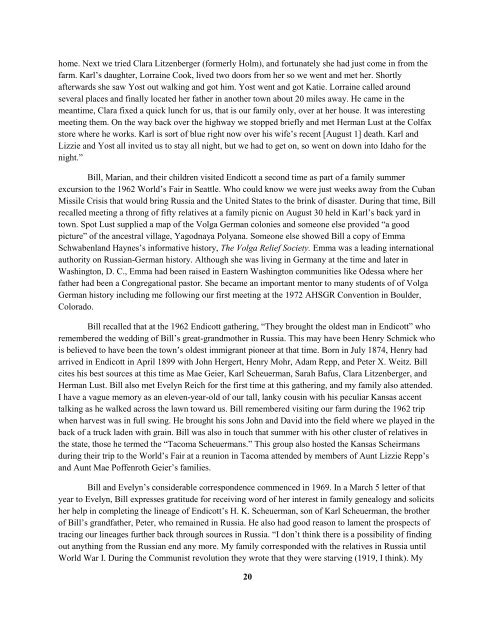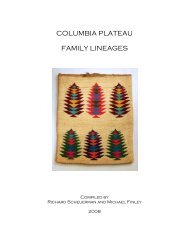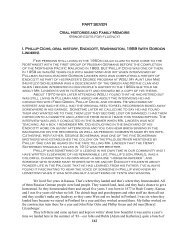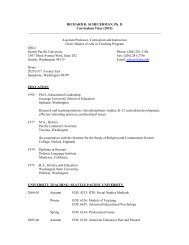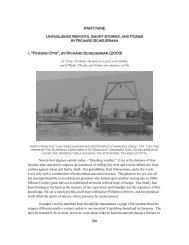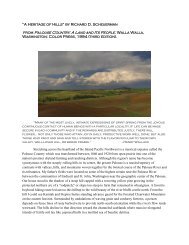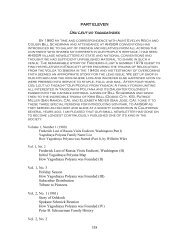THE BERRY MEADOW ARCHIVE - Mountain Light School
THE BERRY MEADOW ARCHIVE - Mountain Light School
THE BERRY MEADOW ARCHIVE - Mountain Light School
Create successful ePaper yourself
Turn your PDF publications into a flip-book with our unique Google optimized e-Paper software.
home. Next we tried Clara Litzenberger (formerly Holm), and fortunately she had just come in from the<br />
farm. Karl‟s daughter, Lorraine Cook, lived two doors from her so we went and met her. Shortly<br />
afterwards she saw Yost out walking and got him. Yost went and got Katie. Lorraine called around<br />
several places and finally located her father in another town about 20 miles away. He came in the<br />
meantime, Clara fixed a quick lunch for us, that is our family only, over at her house. It was interesting<br />
meeting them. On the way back over the highway we stopped briefly and met Herman Lust at the Colfax<br />
store where he works. Karl is sort of blue right now over his wife‟s recent [August 1] death. Karl and<br />
Lizzie and Yost all invited us to stay all night, but we had to get on, so went on down into Idaho for the<br />
night.”<br />
Bill, Marian, and their children visited Endicott a second time as part of a family summer<br />
excursion to the 1962 World‟s Fair in Seattle. Who could know we were just weeks away from the Cuban<br />
Missile Crisis that would bring Russia and the United States to the brink of disaster. During that time, Bill<br />
recalled meeting a throng of fifty relatives at a family picnic on August 30 held in Karl‟s back yard in<br />
town. Spot Lust supplied a map of the Volga German colonies and someone else provided “a good<br />
picture” of the ancestral village, Yagodnaya Polyana. Someone else showed Bill a copy of Emma<br />
Schwabenland Haynes‟s informative history, The Volga Relief Society. Emma was a leading international<br />
authority on Russian-German history. Although she was living in Germany at the time and later in<br />
Washington, D. C., Emma had been raised in Eastern Washington communities like Odessa where her<br />
father had been a Congregational pastor. She became an important mentor to many students of of Volga<br />
German history including me following our first meeting at the 1972 AHSGR Convention in Boulder,<br />
Colorado.<br />
Bill recalled that at the 1962 Endicott gathering, “They brought the oldest man in Endicott” who<br />
remembered the wedding of Bill‟s great-grandmother in Russia. This may have been Henry Schmick who<br />
is believed to have been the town‟s oldest immigrant pioneer at that time. Born in July 1874, Henry had<br />
arrived in Endicott in April 1899 with John Hergert, Henry Mohr, Adam Repp, and Peter X. Weitz. Bill<br />
cites his best sources at this time as Mae Geier, Karl Scheuerman, Sarah Bafus, Clara Litzenberger, and<br />
Herman Lust. Bill also met Evelyn Reich for the first time at this gathering, and my family also attended.<br />
I have a vague memory as an eleven-year-old of our tall, lanky cousin with his peculiar Kansas accent<br />
talking as he walked across the lawn toward us. Bill remembered visiting our farm during the 1962 trip<br />
when harvest was in full swing. He brought his sons John and David into the field where we played in the<br />
back of a truck laden with grain. Bill was also in touch that summer with his other cluster of relatives in<br />
the state, those he termed the “Tacoma Scheuermans.” This group also hosted the Kansas Scheirmans<br />
during their trip to the World‟s Fair at a reunion in Tacoma attended by members of Aunt Lizzie Repp‟s<br />
and Aunt Mae Poffenroth Geier‟s families.<br />
Bill and Evelyn‟s considerable correspondence commenced in 1969. In a March 5 letter of that<br />
year to Evelyn, Bill expresses gratitude for receiving word of her interest in family genealogy and solicits<br />
her help in completing the lineage of Endicott‟s H. K. Scheuerman, son of Karl Scheuerman, the brother<br />
of Bill‟s grandfather, Peter, who remained in Russia. He also had good reason to lament the prospects of<br />
tracing our lineages further back through sources in Russia. “I don‟t think there is a possibility of finding<br />
out anything from the Russian end any more. My family corresponded with the relatives in Russia until<br />
World War I. During the Communist revolution they wrote that they were starving (1919, I think). My<br />
20


